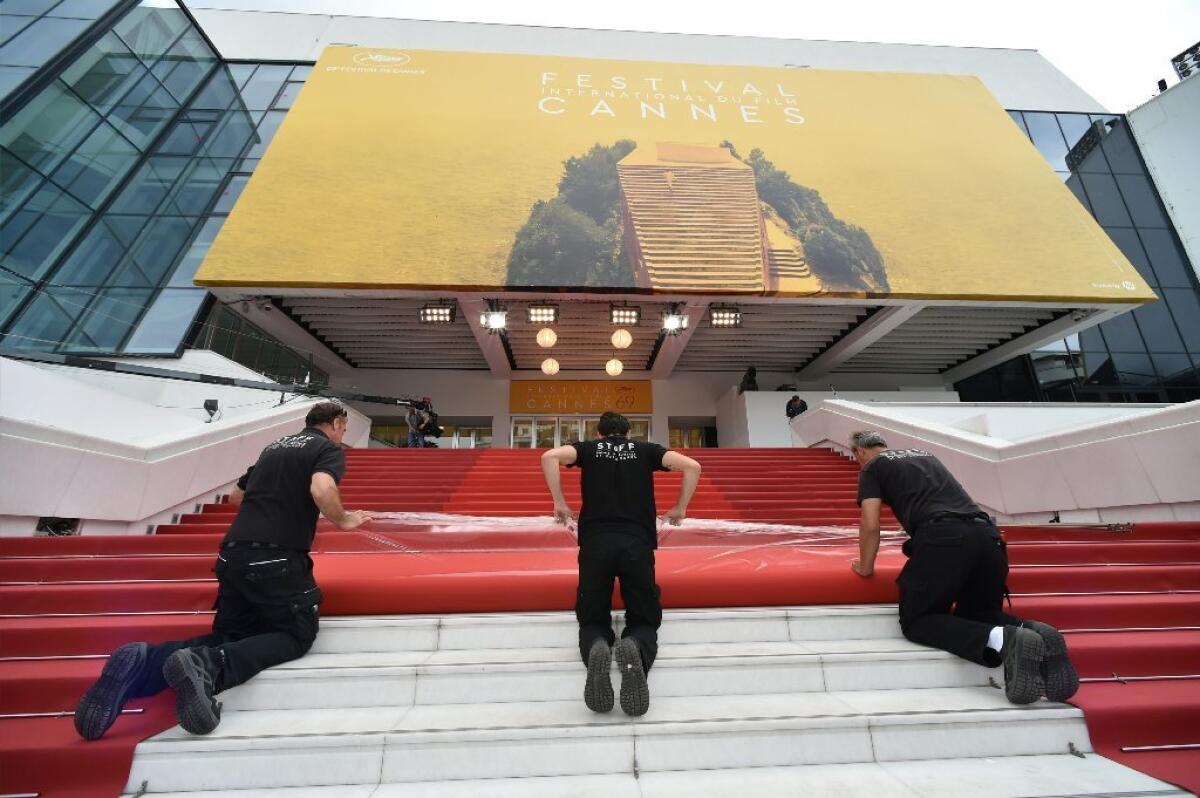An apocalyptic air hangs over the Cannes Film Festival. Will Woody Allen’s latest lighten the mood?

- Share via
Reporting from CANNES, France — CANNES, France – The morning of the day before the 69th Cannes Film Festival dawned dark and overcast, as if the skies were prepared to cry over the selection of films on tap. Whether they will be predominantly tears of joy or of sorrow remains, as always, to be seen.
A similar ambivalence can be read into Cannes’ 2016 poster, just installed above the Palais des Festivals where the red carpet screening for Woody Allen’s “Café Society” starring Jesse Eisenberg, Kristen Stewart and Steve Carell opens the event on Wednesday night.
Designed using stills from Jean-Luc Godard’s classic “Contempt,” the image is of a man going up an enormous staircase on the outside of a pyramidal building. Is he ascending to artistic heights, or headed for sacrificial doom? Or both?
Darker thoughts seem everywhere at the festival this year. Instead of its usual story featuring smiling stars arriving at the airport, the local daily newspaper Nice-Matin ran the words “High Security” on its front page followed by a two-page spread headlined “The 69th edition faces a terrorist menace.”
With France remaining under the state of emergency that began after the November Paris attacks, the city of Cannes has hired a top Israeli consultant to beef up security, but people are still worried. “I’d be happy,” Sony Pictures Classics co-president Tom Bernard told the Hollywood Reporter, “to see dogs roaming the lobby of the Carlton.”
Even the billboards for forthcoming films posted around town have something of an apocalyptic air. Yes, a revolving sculpture created from enormous playing cards that advertised “Now You See Me 2” is charming, but then there was the poster for something called “Tsunami L.A.,” complete with an illustration of the world’s biggest wave smashing into Pacific Coast Highway and the head-shaking tagline “Traffic’s Gonna Be A Bitch Today.”
Still, the hope for the more than 200,000 cinephile visitors (including a mind-boggling 5,000 journalists) who annually flood this resort town is that the films, starting with Allen’s record-breaking third opening night (after “Hollywood Ending” in 2002 and “Midnight In Paris” in 2011) will lighten the mood.
“Café Society” costar Stewart, who last year became the first American actress to win a César, the French Oscar, for her work in Olivier Assayas’ “Clouds of Sils Maria,” is back with another Assayas film, “Personal Shopper.”
Other American pictures are also here to help, starting with a trio playing, as Allen’s is, out of competition. These include Steven Spielberg’s “The BFG,” from the beloved Roald Dahl book, Shane Black’s neo-noir “The Nice Guys” starring Russell Crowe and Ryan Gosling, and the Jodie Foster-directed “Money Monster,” with George Clooney.
American films in actual competition include Jim Jarmusch’s “Paterson,” Sean Penn’s “The Last Face,” a love story set in the world of African NGO’s starring Javier Bardem and Charlize Theron, and, perhaps most intriguing, Jeff Nichols’ “Loving,” starring Joel Edgerton and Ruth Negga in the based-on-fact story of the Virginia couple whose case led the Supreme Court to legalize interracial marriage.
Nichols, on a roll after “Midnight Special,” is a Cannes favorite: His “Mud” was also in competition and an image from his “Take Shelter” is the poster for this year’s Critics’ Week, one of the festival’s parallel events.
One of this year’s most anticipated American films ended up in Cannes’ other parallel event, Directors’ Fortnight. That would be Laura Poitras’ documentary “Risk,” the follow-up to her Oscar winning “Citizenfour.” While the earlier film focused on whistle blower Edward Snowden, the new one is a look at another disturber of the peace, Wikileaks’ Julian Assange.
There are, of course, a lot more than American films at Cannes; in fact, the festival counts works from 28 countries in the main event. These include new competition efforts from venerable auteurs like Spain’s Pedro Almodovar (“Julieta”), Belgium’s the Dardennes brothers (“The Unknown Girl”), Britain’s Ken Loach (“I, Daniel Blake”) and a late addition, Iran’s Asghar Farhadi (“The Salesman”). The latest from Japanese master Kore-eda Hirokazu (“After The Storm”) ended up in the sidebar Un Certain Regard section.
Gaining in stature and interest every year is Cannes Classics, devoted to films on film and new restorations of, well, classics. This year’s more than 40 programs range from a restoration of the Merchant/Ivory “Howards End” to Bertrand Tavernier’s three-hour-plus tribute to his country’s films, “Voyage Through French Cinema.”
One of Cannes’ most fascinating elements are the irrepressible things that happen off screen, the sheer energy of so many people from so many parts of the world coming here for so many reasons, a situation reflected in the variety of unexpected emails the event produces.
The Thai film industry, for instance, wanted me to know that a Thai royal princess would be here for a promotional event it describes as “Thaiconic.” Luxury brands like Tiffany, Kering and Jaeger-LeCoultre, the maker of “haute horlogerie” watches, all have events here. And the filmmakers behind “Direct Descendant,” the story of William Patrick Hitler, the Führer’s putative English-born nephew, were happy to announce it was ready for financing.
“Your future is chaos,” insists a Carlton Hotel billboard for a film called “Future World.” For the next 10 days at Cannes, that says it all.
More to Read
Only good movies
Get the Indie Focus newsletter, Mark Olsen's weekly guide to the world of cinema.
You may occasionally receive promotional content from the Los Angeles Times.










